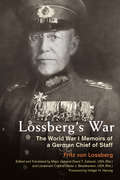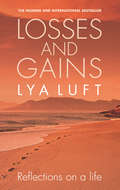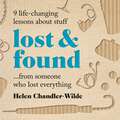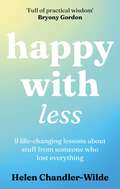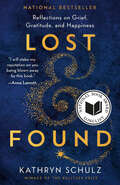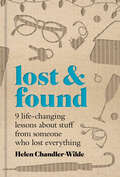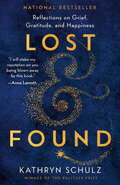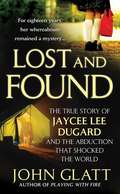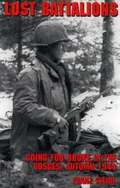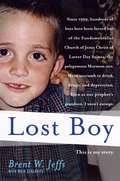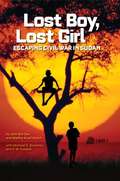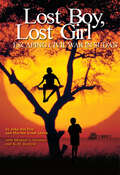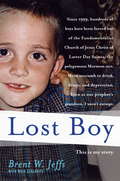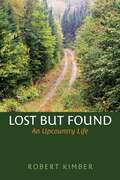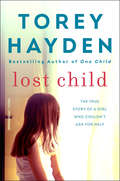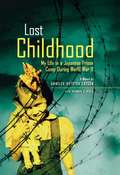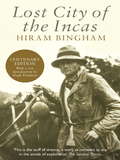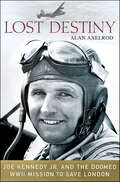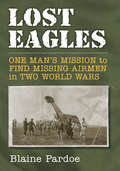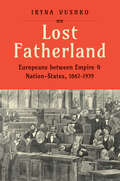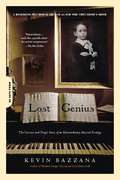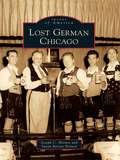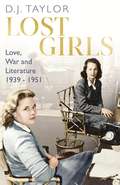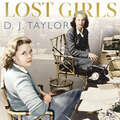- Table View
- List View
Lossberg's War: The World War I Memoirs of a German Chief of Staff (Foreign Military Studies)
by Fritz von Lossberg&“This book is a work of detail and scholars can now envision the campaigns and battles of the First World War from a high-level German perspective.&” —Journal of Military History Gen. Fritz von Lossberg (1868-1942) directed virtually all the major German defensive battles on the Western Front during the First World War. Hailed as &“the Lion of the Defensive,&” he was an extremely influential military tactician and, unlike many other operations officers of his era, was quick to grasp the changes wrought by technology. Now available for the first time in English, Lossberg&’s memoir explains how he developed, tested, and implemented his central principles—flexibility, decentralized control, and counterattack—which were based on a need to adapt to shifting conditions on the battlefield. Lossberg first put his theory of elastic defense combined with defense-in-depth into practice during the Battle of Arras (April-May 1917), where it succeeded. At the Battle of Passchendaele (June-November 1917), his achievements on the field proved the feasibility of his strategy of employing a thinly manned front line that minimized the number of soldiers exposed to artillery fire. Lossberg&’s tactical modernizations have become essential components of army doctrine, and Lossberg&’s War: The World War I Memoirs of a German Chief of Staff will take readers inside the mind of one of the most significant military innovators of the twentieth century. &“Make no mistake about it, the appearance of this book is one of the most significant Great War publishing events of the year. It deserves to be on the shelf of every serious student of this titanic conflict.&” —Stand To!
Losses and Gains: Reflections on a Life with a Foreword by Paolo Coelho
by Lya Fett LuftIn her bestselling book Losses and Gains, Lya Luft draws on her own experiences of loss and gain in marriage and family to address the universal themes of childhood, love and maturity. She portrays love as the common thread through all phases of life. As children, the unconditional love we receive from our parents determines our expectations for all the other forms of love we experience later. And as adults, she argues, the complex task of loving another depends, initially, on self-love and self-esteem. Luft's ardent reflections on existence and the human spirit are a powerful reminder to us all: we have lost everything only when we believe we deserve less than everything still to be gained.
Lost & Found: 9 life-changing lessons about stuff from someone who lost everything
by Helen Chandler-WildeAn exploration into why we keep holding on to material things and what they mean to usOn New Year's Eve of 2018, journalist Helen Chandler-Wilde lost everything she owned in a storage unit fire in Croydon, where she'd stowed all her possessions after a big break-up. She was left devastated, and forced to re-evaluate her relationship with owning material things. A mix of memoir, self-help and journalism, Lost & Found explores the psychological reasons for why we buy and keep the things we do, and explains how we can liberate ourselves from the tyranny of 'too much'. Helen interviews people from all walks of life, including behavioural psychologists on the science of nostalgia, a nun on what it's like to own almost nothing and consumer psychologists on why we spend impulsively, to help us better understand why we're surrounded by clutter and what we can do to change it.This smart-thinking book explains the sociological quirks of human nature and the fascinating science behind why we buy and hold onto things. By the end of it, your relationship with your belongings will be changed forever.
Lost & Found: 9 life-changing lessons about stuff from someone who lost everything
by Helen Chandler-WildeAn exploration into why we keep holding on to material things and what they mean to usOn New Year's Eve of 2018, journalist Helen Chandler-Wilde lost everything she owned in a storage unit fire in Croydon, where she'd stowed all her possessions after a big break-up. She was left devastated, and forced to re-evaluate her relationship with owning material things. A mix of memoir, self-help and journalism, Lost & Found explores the psychological reasons for why we buy and keep the things we do, and explains how we can liberate ourselves from the tyranny of 'too much'. Helen interviews people from all walks of life, including behavioural psychologists on the science of nostalgia, a nun on what it's like to own almost nothing and consumer psychologists on why we spend impulsively, to help us better understand why we're surrounded by clutter and what we can do to change it.This smart-thinking book explains the sociological quirks of human nature and the fascinating science behind why we buy and hold onto things. By the end of it, your relationship with your belongings will be changed forever.
Lost & Found: A Memoir
by Kathryn SchulzAn enduring account of joy and sorrow from one of the great writers of our time, The New Yorker&’s Kathryn Schulz, winner of the Pulitzer Prize&“Our lives do indeed deserve and reward the kind of honest, gentle, brilliant scrutiny Schulz brings to bear on her own life. The book is profound and beautiful.&”—Marilynne Robinson, author of Housekeeping and GileadONE OF THE MOST ANTICIPATED BOOKS OF 2022—Oprah Daily, The Washington Post, Vogue, The Philadelphia Inquirer, Esquire, Chicago Review of Books, Town & Country, Electric Lit, The Rumpus, Lit HubEighteen months before Kathryn Schulz&’s beloved father died, she met the woman she would marry. In Lost & Found, she weaves the stories of those relationships into a brilliant exploration of how all our lives are shaped by loss and discovery—from the maddening disappearance of everyday objects to the sweeping devastations of war, pandemic, and natural disaster; from finding new planets to falling in love.Three very different American families form the heart of Lost & Found: the one that made Schulz&’s father, a charming, brilliant, absentminded Jewish refugee; the one that made her partner, an equally brilliant farmer&’s daughter and devout Christian; and the one she herself makes through marriage. But Schulz is also attentive to other, more universal kinds of conjunction: how private happiness can coexist with global catastrophe, how we get irritated with those we adore, how love and loss are themselves unavoidably inseparable. The resulting book is part memoir, part guidebook to living in a world that is simultaneously full of wonder and joy and wretchedness and suffering—a world that always demands both our gratitude and our grief.A staff writer at The New Yorker and winner of the Pulitzer Prize, Kathryn Schulz writes with curiosity, tenderness, erudition, and wit about our finite yet infinitely complicated lives. Crafted with the emotional clarity of C. S. Lewis and the intellectual force of Susan Sontag, Lost & Found is an uncommon book about common experiences.
Lost & Found: Nine life-changing lessons about stuff from someone who lost everything
by Helen Chandler-WildeWhy do we buy and keep the things we do, and how can we live a less cluttered life? Journalist Helen Chandler-Wilde dives deep to explore, explain, and guide us on the path to liberation from the tyranny of "too much."On New Year's Eve of 2018, Helen Chandler-Wilde lost everything she owned in a storage unit fire in Croydon, England, where she'd stowed all her possessions after a big breakup. She was left devastated and forced to re-evaluate her relationship with owning material things.In Lost & Found, she offers a profound mix of memoir, self-help, and journalism to explore the psychological reasons, sociological quirks of human nature, and fascinating science behind why we buy and hold onto things. Helen interviews people from all walks of life, including behavioral psychologists on the science of nostalgia, a nun on what it's like to own almost nothing, and consumer psychologists on why we spend impulsively, to help us better understand why we're surrounded by clutter and what we can do to change it.By the end of this smart-thinking book filled with lessons and engaging prompts to help us gain perspective on our buying habits and the value we place on what we already have, your relationship with your belongings will be changed forever. The perfect "new year, new you" read or gift for anyone who is downsizing, striving for a more sustainable lifestyle, or is eager to cultivate a minimalist mindset.
Lost & Found: Reflections on Grief, Gratitude, and Happiness
by Kathryn SchulzA Pulitzer Prize-winning New Yorker writer tells the story of losing her father and finding the love of her life in this profound meditation on grief and joy.Eighteen months before her beloved father died, Kathryn met Casey, the woman who would become her wife. Lost & Found weaves together their love story with Kathryn's story of losing her father in a brilliant exploration of the way families are lost and found and the ways life dispenses wretchedness and suffering, beauty and grandeur all at once. So much has been written about loss--and Schulz writes with painful clarity about the vicissitudes of grieving her father--but here she writes about the vital phenomenon of finding.The book is organized into three parts: "Lost," which explores the sometimes comic, sometimes frustrating, sometimes heartbreaking experience of losing things, grounded in Kathryn's account of her father's death; "Found," which examines the experience of discovery, from new ideas to new planets, grounded in her story of falling in love; and finally, "And," which contends with the way these events happen in conjunction and imply the inevitable: life keeps going on, not only around us but beyond us and after us. Kathryn Schulz has the ability to measure the depth and breadth of human experience with unusual exactness--she articulates the things all of us feel but have been unable to put into language. Lost & Found is a work of philosophical interrogation as well as a story about life, death and the discovery of one great love just as another is being lost.
Lost Airmen: The Epic Rescue of WWII U.S. Bomber Crews Stranded Behind Enemy Lines
by Charles E. Stanley Jr.Late in 1944, thirteen U.S. B-24 bomber crews bailed from their cabins over the Yugoslavian wilderness. Bloodied and disoriented after a harrowing strike against the Third Reich, the pilots took refugee with the Partisan underground. But the Americans were far from safety. Holed up in a village barely able to feed its citizens, encircled by Nazis, and left abandoned after a team of British secret agents failed to secure their escape, the airmen were left with little choice. It was either flee or be killed. In The Lost Airmen, Charles Stanely Jr. unveils the shocking true story of his father, Charles Stanely-and the eighteen brave soldiers he journeyed with for the first time. Drawing on over twenty years of research, dozens of interviews, and previously unpublished letters, diaries, and memoirs written by the airmen, Stanley recounts the deadly journey across the blizzard-swept Dinaric Alps during the worst winter of the Twentieth Century-and the heroic men who fought impossible odds to keep their brothers in arms alive.
Lost And Found: The True Story Of Jaycee Lee Dugard And The Abduction That Shocked The World
by John GlattThen, in August 2009, a registered sex offender named Phillip Garrido appeared on the University of California, Berkeley campus alongside two young women whose unusual behavior sparked concern among campus officials and law enforcement. That visit would pave the way for shocking discovery: that Garrido was Jaycee Lee Dugard's kidnapper... <p><p> Jaycee's story was revealed: For eighteen years, she had lived in an outbuilding on the Garrido property in Antioch, CA, just two hours away from her childhood home. Kept in complete isolation, she was raped by Garrido, who fathered her two daughters. When news broke of Jaycee's discovery, there was a huge outpouring of relief across the nation. But questions remain: How did the Garridos slip past authorities? And how did Jaycee endure her captivity? This is the story of a girl-next-door who was Lost and Found.
Lost Battalions: Going for Broke in the Vosges, Autumn 1944
by Franz SteidlThe story of two World War II battalions--one German, one American--each cut off behind enemy lines in the same forest at the same time, and the heroic efforts to save them.
Lost Boy
by Maia Szalavitz Brent W. JeffsStarred Review. In this moving debut memoir, the nephew of a Mormon sect leader chronicles life in the Fundamentalist Church of Jesus Christ of Latter Day Saints, and what came after. Among a 10,000-member Mormon community, Jeffs grew up with three mothers, more than a dozen siblings, and a deep fear of the world outside of the church. Within the secretive community, Jeffs was taught that purity came from special attention to dress, hard work, generosity and, most importantly, obedience to one's elders (especially his uncle, the prophet Warren Jeffs). The focus of this fast-paced memoir is the sexual abuse Jeffs and his brothers endured at the hands of their relatives during church and school functions, for which he would file a class-action lawsuit in 2004. Jeffs's descent into depression proves the beginning of the end for his relationship with the church and, consequently, with much of his family. Jeffs outlines the core beliefs of the Church, along with the oppressive ends to which they were used, and the heartbreaking fate of those church members expelled into a society they were raised to see as evil and corrupt. This hard-to-put-down, tightly woven account pulls back the curtain on what's become a perennial news story, while illustrating the impiety of absolute power and the delicacy of innocence. Copyright Reed Business Information, a division of Reed Elsevier Inc. All rights reserved.
Lost Boy, Lost Girl: Escaping Civil War in Sudan
by John Bul Dau Martha Arual AkechOne of thousands of children who fled strife in southern Sudan, John Bul Dau survived hunger, exhaustion, and violence. His wife, Martha, endured similar hardships. In this memorable book, the two convey the best of African values while relating searing accounts of famine and war. There's warmth as well, in their humorous tales of adapting to American life. For its importance as a primary source, for its inclusion of the rarely told female perspective of Sudan's lost children, for its celebration of human resilience, this is the perfect story to inform and inspire young readers.
Lost Boy, Lost Girl: Escaping Civil War in Sudan
by John Bul DauOne of thousands of children who fled strife in southern Sudan, John Bul Dau survived hunger, exhaustion, and violence. His wife, Martha, endured similar hardships. In this memorable book, the two convey the best of African values while relating searing accounts of famine and war. There’s warmth as well, in their humorous tales of adapting to American life. For its importance as a primary source, for its inclusion of the rarely told female perspective of Sudan’s lost children, for its celebration of human resilience, this is the perfect story to inform and inspire young readers.
Lost Boy: The True Story of One Man's Exile from a Polygamist Cult and His Brave Journey to Reclaim His Life
by Maia Szalavitz Brent W. JeffsIn the polygamous Fundamentalist Church of Jesus Christ of Latter-day Saints (FLDS), girls can become valuable property as plural wives, but boys are expendable, even a liability. In this powerful and heartbreaking account, former FLDS member Brent Jeffs reveals both the terror and the love he experienced growing up on his prophet’s compound—and the harsh exile existence that so many boys face once they have been expelled by the sect. Brent Jeffs is the nephew of Warren Jeffs, the imprisoned leader of the FLDS. The son of a prominent family in the church, Brent could have grown up to have multiple wives of his own and significant power in the 10,000-strong community. But he knew that behind the group’s pious public image—women in chaste dresses carrying babies on their hips—lay a much darker reality. So he walked away, and was the first to file a sexual-abuse lawsuit against his uncle. Now Brent shares his courageous story and that of many other young men who have become “lost boys” when they leave the FLDS, either by choice or by expulsion. Brent experienced firsthand the absolute power that church leaders wield—the kind of power that corrupts and perverts those who will do anything to maintain it. Once young men no longer belong to the church, they are cast out into a world for which they are utterly unprepared. More often than not, they succumb to the temptations of alcohol and other drugs. Tragically, Brent lost two of his brothers in this struggle, one to suicide, the other to overdose. In this book he shows that lost boys can triumph and that abuse and trauma can be overcome, and he hopes that readers will be inspired to help former FLDS members find their way in the world.
Lost But Found: An Upcountry Life
by Robert KimberRobert Kimber has led a largely rural life as a farmer, writer, and woodsman. The essays gathered in this wide-ranging collection reflect a lifetime of adventures and misadventures. Kimber writes of canoeing and fishing, stubborn sheep and old tractors, and the joys of roaming the woods with his dog. Seasoned with a dash of wit and self-irony, this paean to the upcountry life is as fresh and bracing as it is affectionate.
Lost Child: The True Story of a Girl Who Couldn't Ask for Help
by Torey HaydenThe first new book from beloved therapist and writer Torey Hayden in almost fifteen years—an inspiring, uplifting tale of a troubled child and the remarkable woman who made a difference.In a forgotten corner of Wales, a young girl languishes in a home for troubled children. Abandoned by her parents because of her violent streak, Jessie—at the age of ten—is at risk of becoming just another lost soul in the foster system. Precocious and bold, Jessie is convinced she is possessed by the devil and utterly unprepared for the arrival of therapist Torey Hayden. Armed with patience, compassion, and unconditional love, Hayden begins working with Jessie once a week. But when Jessie makes a stunning accusation against one of Hayden’s colleagues – a man Hayden implicitly trusts – Hayden’s work doubles: now she must not only get to the root of Jessie’s troubles, but also find out if what the girl alleges is true.A moving, compelling, and inspiring account, Lost Child is a powerful testament once again of Torey Hayden’s extraordinary ability to reach children who many have given up on—and a reminder of how patience and love can ultimately prevail.
Lost Childhood: My Life in a Japanese Prison Camp During World War II
by Herman J. Viola Annelex Hofstra LaysonA MYSTERIOUS TELEPHONE CALL, AN EARTHQUAKE, JAPANESE FIGHTER PLANES, AND A DEADLY EXPLOSION . . . It was a day unlike any other that four-year-old Annelex Hofstra had ever experienced. It turned her comfortable, carefree world upside-down and forever changed her life. Immediately after invading the island of Java, in the Dutch East Indies (now Indonesia), the Japanese began rounding up all the Dutch citizens, stripping them of all but the barest necessities, and shipping them off to prison camps. Lost Childhood is a vivid real-life account of how a little Dutch girl, along with her mother and grandmother, managed to survive the horrors of life in these camps during World War II. For three and a half years they were treated as less than human by their captors and lived in a state of constant fear--fear of being punished, of being separated from each other, of starvation, and of dying from infection, malaria, or some other dreaded disease. The Allied victory in 1945 opened the prison gates but did nothing to erase the mental and physical damage caused by life in the camps. For 60 years the author has kept her silence, dealing with her past pain by pushing memories of it to the furthest reaches of her mind. Now she wants to share her story not only to honor all who suffered or died in the camps but also to encourage anyone who feels frightened, trapped, abused, or abandoned to never give up hope.
Lost City of the Incas
by Hiram BinghamFirst published in the 1950s, this is a classic account of the discovery in 1911 of the lost city of Machu Picchu.In 1911 Hiram Bingham, a pre-historian with a love of exotic destinations, set out to Peru in search of the legendary city of Vilcabamba, capital city of the last Inca ruler, Manco Inca. With a combination of doggedness and good fortune he stumbled on the perfectly preserved ruins of Machu Picchu perched on a cloud-capped ledge 2000 feet above the torrent of the Urubamba River. The buildings were of white granite, exquisitely carved blocks each higher than a man. Bingham had not, as it turned out, found Vilcabamba, but he had nevertheless made an astonishing and memorable discovery, which he describes in his bestselling book LOST CITY OF THE INCAS.
Lost Destiny: Joe Kennedy Jr. and the Doomed WWII Mission to Save London
by Alan AxelrodAlan Axelrod's Lost Destiny is a rare exploration of the origin of today's controversial military drones as well as a searing and unforgettable story of heroism, WWII, and the Kennedy dynasty that might have been.On August 12, 1944, Lieutenant Joseph P. Kennedy, Jr., heir to one of America's most glamorous fortunes, son of the disgraced former ambassador to Great Britain, and big brother to freshly minted PT-109 hero JFK, hoisted himself up into a highly modified B-24 Liberator bomber. The munitions he was carrying that day were fifty percent more powerful than TNT.Kennedy's mission was part of Operation Aphrodite/Project Anvil, a desperate American effort to rescue London from a rain of German V-1 and V-2 missiles. The decision to use these bold but crude precursors to modern-day drones against German V-weapon launch sites came from Air Corps high command. Lieutenant General Jimmy Doolittle, daring leader of the spectacular 1942 Tokyo Raid, and others concocted a plan to install radio control equipment in "war-weary" bombers, pack them with a dozen tons of high explosives, and fly them by remote control directly into the concrete German launch sites—targets too hard to be destroyed by conventional bombs. The catch was that live pilots were needed to get these flying bombs off the ground and headed toward their targets. Joe Jr. was the first naval aviator to fly such a mission. And—in the biggest manmade explosion before Hiroshima—it killed him.
Lost Eagles: One Man's Mission to Find Missing Airmen in Two World Wars
by Blaine PardoePraise forLost Eagles "The pilot and observer stories selected have not previously seen much exposure. Not only are they interesting, but I found myself relishing getting to the next chapter to find out what Frederick Zinn was doing during the next stage of his life. " ---Alan Roesler, founding member, League of World War I Aviation Historians, and former Managing Editor,Over the Front Praise for Blaine Pardoe's previous military histories (which average 4. 5-star customer reviews on Amazon. com): Terror of the Autumn Skies: The True Story of Frank Luke, America's Rogue Ace of World War I "This painstaking biography of World War I ace Frank Luke will earn Pardoe kudos . . . Pardoe has flown a very straight course in researching and recounting Luke's myth-ridden life. . . . Thorough annotation makes the book that much more valuable to WWI aviation scholars as well as for more casual air-combat buffs. " ---Booklist The Cruise of the Sea Eagle: The Amazing True Story of Imperial Germany's Gentleman Pirate "This is a gem of a story, well told, and nicely laid out with photos, maps, and charts that cleverly illuminate the lost era of 'gentlemen pirates' at sea . . . [German commerce raider Felix von Luckner's] legend lives on in this lively and readable biography. " ---Admiral James Stavridis, U. S. Navy, Naval History Few people have ever heard of Frederick Zinn, yet even today airmen's families are touched by this man and the work he performed in both world wars. Zinn created the techniques still in use to determine the final fate of airmen missing in action. The last line of the Air Force Creed reads, "We will leave no airman behind. " Zinn made that promise possible. Blaine Pardoe weaves together the complex story of a man who brought peace and closure to countless families who lost airmen during both world wars. His lasting contribution to warfare was a combination of his methodology for locating the remains of missing pilots (known as the Zinn system) and his innovation of imprinting all aircraft parts with the same serial number so that if a wreck was located, the crewman could be identified. The tradition he established for seeking and recovering airmen is carried on to this day. Blaine Pardoe is an accomplished author who has published dozens of military fiction novels and other books, including the widely acclaimedCubicle Warfare: Self-Defense Tactics for Today's Hypercompetitive Workplace;Terror of the Autumn Skies: The True Story of Frank Luke, America's Rogue Ace of World War I;andThe Cruise of the Sea Eagle: The Amazing True Story of Imperial Germany's Gentleman Pirate. Jacket photo: Frederick Zinn's Sopwith aircraft, which crashed during World War I. National Museum of the United States Air Force Archives.
Lost Fatherland: Europeans between Empire and Nation-States, 1867-1939
by Iryna VushkoHow the demise of the Habsburg Empire, postwar sovereignty, and new diplomatic frontiers shaped the nature of citizenship, identity, and belonging across Europe This book is a collective portrait of twenty-one key statesmen who came of age during the Habsburg Empire. They include the cofounder of Austro-Marxism and the Austrian republic&’s first foreign minister, the cofounder of the European Union after the Second World War, the founder of the Communist Party of Czechoslovakia, and Mussolini&’s ambassador to Vienna. Some survived the First World War and the resulting geographical divisions in their homelands, and some went on to serve in politics and governments throughout Europe. Taken together, the stories of these men offer readers a window on broad issues of European history in the late nineteenth and early twentieth centuries—chiefly, how an imperial heritage, a shared vision of statehood and nationalism, and a commitment to peaceful conflict resolution helped establish enduring loyalty and unity despite the geographical fault lines resulting from the war. As Iryna Vushko explains, their stories also offer an increasingly nuanced understanding of the achievements and failures of the Habsburg Empire.
Lost Genius: The Curious and Tragic Story of an Extraordinary Musical Prodigy
by Kevin BazzanaBorn in 1903, pianist Ervin Nyiregyházi was the subject of the first book devoted to the scientific study of a single prodigy. By twenty-five he had all but disappeared. Mismanaged, exploited, and unfashionably romantic, his career floundered in adulthood. He drank heavily, married ten times, and was reduced to penury, sometimes living on the subway. He settled in Los Angeles where he performed sporadically, counting many of Holly-wood's elite among his friends, including Gloria Swanson, a likely lover. Rediscovered in the 1970s, he enjoyed a sensational and controversial renaissance, before slipping back into obscurity.
Lost German Chicago (Images of America)
by Joseph C. Heinen Susan Barton HeinenBy 1900, one in four Chicagoans was either German born or had a German-born parent. No other ethnic group's thumbprint has been larger in helping establish Chicago as a major economic and cultural center nor has any group's influence been more erased by the passage and vicissitudes of time. Lost German Chicago traces the mosaic of German life through the tumultuous events of the Beer Riots, Haymarket Affair, Prohibition, and America's entry into two world wars. The book is a companion piece to the Lost German Chicago exhibition debuting in the newly created DANK-Haus German American Cultural Center museum, located in what is still known today as the "German town" of the north side of Chicago. Entrusted as the caretaker of many archives, artifacts, and historical documents from many now defunct German organizations, the DANK-Haus German American Cultural Center has been committed to preserving history, traditions, and contributions of Germans and German Americans for over 50 years.
Lost Girls: Love, War and Literature: 1939-51
by D.J. TaylorA Times Book of the Year 2019'You should not deny yourself the pleasure of reading it' Sunday Times'A remarkable work and an important addition to the extraordinary wartime history of literary London' Literary ReviewWho were the Lost Girls? At least a dozen or so young women at large in Blitz-era London have a claim to this title. But Lost Girls concentrates on just four: Lys Lubbock, Sonia Brownell, Barbara Skelton and Janetta Parlade. Chic, glamorous and bohemian, as likely to be found living in a rat-haunted maisonette as dining at the Ritz, they cut a swathe through English literary and artistic life in the 1940s. Three of them had affairs with Lucian Freud. One of them married George Orwell. Another became the mistress of the King of Egypt and was flogged by him on the steps of the Royal Palace. And all of them were associated with the decade's most celebrated literary magazine, Horizon, and its charismatic editor Cyril Connolly. Lys, Sonia, Barbara and Janetta had very different - and sometimes explosive personalities - but taken together they form a distinctive part of the war-time demographic: bright, beautiful, independent-minded women with tough upbringings behind them determined to make the most of their lives in a highly uncertain environment. Theirs was the world of the buzz bomb, the cocktail party behind blackout curtains, the severed hand seen on the pavement in the Bloomsbury square, the rustle of a telegram falling through the letter-box, the hasty farewell to another half who might not ever come back, a world of living for the moment and snatching at pleasure before it disappeared. But if their trail runs through vast acreages of war-time cultural life then, in the end, it returns to Connolly and his amorous web-spinning, in which all four of them regularly featured and which sometimes complicated their emotional lives to the point of meltdown.The Lost Girls were the product of a highly artificial environment. After it came to an end - on Horizon's closure in 1950 - their careers wound on. Later they would have affairs with dukes, feature in celebrity divorce cases and make appearances in the novels of George Orwell, Evelyn Waugh, Anthony Powell and Nancy Mitford. The last of them - Janetta - died as recently as three months ago. However tiny their number, they are a genuine missing link between the first wave of newly-liberated young women of the post-Great War era and the Dionysiac free-for-all of the 1960s. Hectic, passionate and at times unexpectedly poignant, this is their story.
Lost Girls: Love, War and Literature: 1939-51
by D.J. TaylorA Times Book of the Year 2019'You should not deny yourself the pleasure of reading it' Sunday Times'A remarkable work and an important addition to the extraordinary wartime history of literary London' Literary ReviewWho were the Lost Girls? At least a dozen or so young women at large in Blitz-era London have a claim to this title. But Lost Girls concentrates on just four: Lys Lubbock, Sonia Brownell, Barbara Skelton and Janetta Parlade. Chic, glamorous and bohemian, as likely to be found living in a rat-haunted maisonette as dining at the Ritz, they cut a swathe through English literary and artistic life in the 1940s. Three of them had affairs with Lucian Freud. One of them married George Orwell. Another became the mistress of the King of Egypt and was flogged by him on the steps of the Royal Palace. And all of them were associated with the decade's most celebrated literary magazine, Horizon, and its charismatic editor Cyril Connolly. Lys, Sonia, Barbara and Janetta had very different - and sometimes explosive personalities - but taken together they form a distinctive part of the war-time demographic: bright, beautiful, independent-minded women with tough upbringings behind them determined to make the most of their lives in a highly uncertain environment. Theirs was the world of the buzz bomb, the cocktail party behind blackout curtains, the severed hand seen on the pavement in the Bloomsbury square, the rustle of a telegram falling through the letter-box, the hasty farewell to another half who might not ever come back, a world of living for the moment and snatching at pleasure before it disappeared. But if their trail runs through vast acreages of war-time cultural life then, in the end, it returns to Connolly and his amorous web-spinning, in which all four of them regularly featured and which sometimes complicated their emotional lives to the point of meltdown.The Lost Girls were the product of a highly artificial environment. After it came to an end - on Horizon's closure in 1950 - their careers wound on. Later they would have affairs with dukes, feature in celebrity divorce cases and make appearances in the novels of George Orwell, Evelyn Waugh, Anthony Powell and Nancy Mitford. The last of them - Janetta - died as recently as three months ago. However tiny their number, they are a genuine missing link between the first wave of newly-liberated young women of the post-Great War era and the Dionysiac free-for-all of the 1960s. Hectic, passionate and at times unexpectedly poignant, this is their story.
